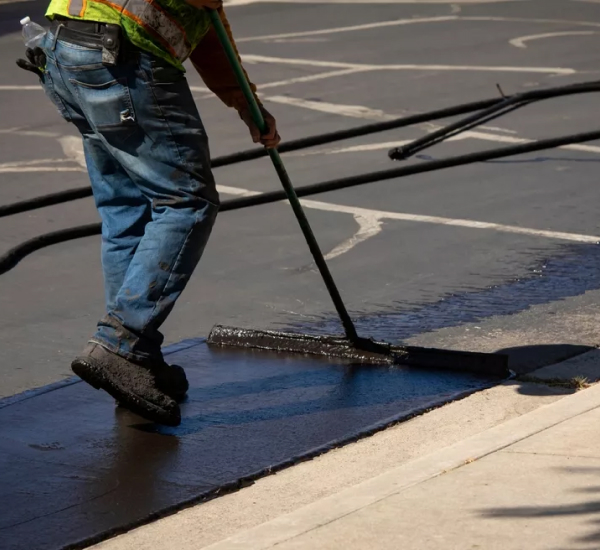
If you own an asphalt driveway or manage a business that has an asphalt parking lot, then you’ve likely heard of seal coating. Seal coating is a common recommendation to maintain and extend the life of your asphalt surfaces. However, you might wonder what the seal coating process is and how it will disrupt your life or your business. In this article, we will talk about the seal coating process so you’ll know what to expect the next time you have seal coating work performed.
Before we get to the actual seal coating process, let’s take a step back and discuss seal coating for those who don’t understand the term. Seal coating is the process of adding a layer of coal-tar, asphalt emulsions, or acrylics over your asphalt pavement in order to protect it, much like you protect your skin from the sun by using sunscreen or protect your clothes from getting wet by wearing a rain jacket.
Seal coating is an essential way to protect your asphalt from the elements — sun which can cause oxidation and moisture that can cause cracking. It can also protect against chemicals that can damage the surface (like gas, oil, and antifreeze). A final benefit is the beauty — the seal coating process creates a uniform color and a like-new appearance.
For more on the benefits of seal coating, check out 7 Reasons to Seal Coat Your Driveway or Parking Lot This Fall.
Seal coat is the name for the substance used in the seal coating process. There are three main types:
Seal coating companies must make a choice of what coat to use. At Integrity Paving & Coatings we use a special Integrity seal coat emulsion that is tough, durable, and environmentally friendly, with low VOC and no obnoxious odors or fumes. Our seal coat emulsion outperforms other coal-tar and asphalt-based coatings on the market. It also includes a rubberized hardener that increases the effectiveness, enhances adhesion, and reduces drying time up to 50%.
Each sealing company will have its own process, but at Integrity Paving & Coatings, we handle seal coating with the following procedure:
Seal coating is performed from spring through fall. This is because the process requires temperatures of at least 50 degrees and rising, and no more than a 40% chance of rain. Outside of those conditions, you risk the seal coating not curing properly.
Perhaps the most important part of the seal coating process is how it impacts YOU. At Integrity Paving & Coatings, we communicate with you to create a plan that will minimize disruption for your residents, customers, visitors, and staff. Our crews are highly experienced and efficient, so there is no need to worry about having to shut your parking lot down for an extended period of time.
Seal coating should be performed between six months to one year after new asphalt is installed. After that, seal coating is recommended every three years. Now that you understand the reasons for seal coating and the seal coating process, you’ll know what to expect.
Is it time to seal coat your driveway? Give Integrity Paving & Coatings a call at (512) 853-9009 to schedule a quote.

Schedule your free, on-site consultation and estimate today! Call Integrity Paving & Coatings at (512) 853-9009 or get your quote online.